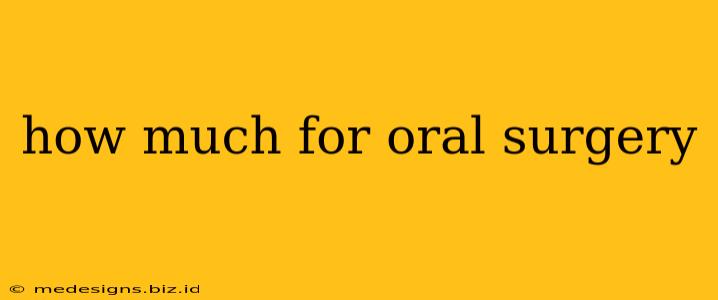Oral surgery can encompass a wide range of procedures, from simple extractions to complex bone grafts. Therefore, pinpointing an exact cost is impossible without knowing the specifics of your case. However, this guide will break down the factors influencing the price and provide you with a better understanding of what to expect.
Factors Affecting Oral Surgery Costs
Several factors significantly impact the final cost of your oral surgery:
1. Type of Procedure:
This is arguably the most important factor. Simple extractions of healthy teeth are significantly cheaper than complex procedures like:
- Impacted Wisdom Teeth Removal: The difficulty of accessing and removing impacted wisdom teeth significantly increases the cost. If there are complications, the price can rise further.
- Bone Grafts: Bone grafting, often necessary before implant placement, is a more involved procedure and therefore more expensive.
- Dental Implants: Implants are a substantial investment, encompassing multiple stages and specialized materials.
- Cleft Palate Repair: This is a highly specialized procedure with a correspondingly high cost.
- Orthognathic Surgery (Jaw Surgery): This complex procedure to correct jaw misalignments is typically the most expensive type of oral surgery.
2. Anesthesia:
The type of anesthesia used will affect the cost. Local anesthesia is the least expensive, while general anesthesia is significantly more costly due to the increased medical supervision required. Sedation dentistry falls somewhere in between.
3. Geographic Location:
The cost of living and the prevailing rates in your geographic area will directly impact the fees charged by oral surgeons. Urban areas tend to have higher costs than rural areas.
4. Surgeon's Experience and Expertise:
A highly experienced and specialized oral surgeon may charge more than a less experienced practitioner. The surgeon's reputation and the facilities they use also play a role.
5. Additional Services:
Pre-operative X-rays, consultations, post-operative care, and medications all contribute to the overall cost. Unexpected complications during the procedure can also lead to additional expenses.
6. Insurance Coverage:
Your dental insurance plan will significantly affect your out-of-pocket expenses. It's crucial to check your policy's coverage for oral surgery procedures before scheduling your appointment. Some plans may cover a portion of the cost, while others may offer limited or no coverage. Understanding your benefits and limitations will prevent unexpected financial burdens.
Getting an Accurate Estimate
The only way to get an accurate estimate of the cost of your oral surgery is to schedule a consultation with an oral surgeon. During this consultation, they will:
- Examine your condition: The surgeon will conduct a thorough examination, including X-rays if necessary.
- Discuss the procedure: The surgeon will explain the necessary steps, potential risks, and the expected recovery time.
- Provide a detailed cost estimate: You will receive a written estimate outlining the anticipated costs, including fees for the procedure, anesthesia, and any other related services.
- Discuss payment options: Many oral surgeons offer various payment plans to help manage the cost of treatment. Inquire about financing options and insurance claims processes.
Affording Oral Surgery
Oral surgery can be expensive, but several options are available to make it more affordable:
- Payment Plans: Many oral surgeons offer in-house payment plans.
- Dental Financing Companies: Companies specializing in financing healthcare procedures can provide loans with manageable monthly payments.
- Dental Insurance: Maximize your insurance coverage by carefully reviewing your policy and ensuring the necessary pre-authorization steps are taken.
Remember, prioritizing your oral health is crucial for your overall well-being. Don't let cost deter you from seeking necessary treatment. Discuss your concerns openly with your oral surgeon; they can help you find affordable solutions. A proactive approach and understanding the contributing factors to cost will help you navigate the financial aspects of oral surgery effectively.
